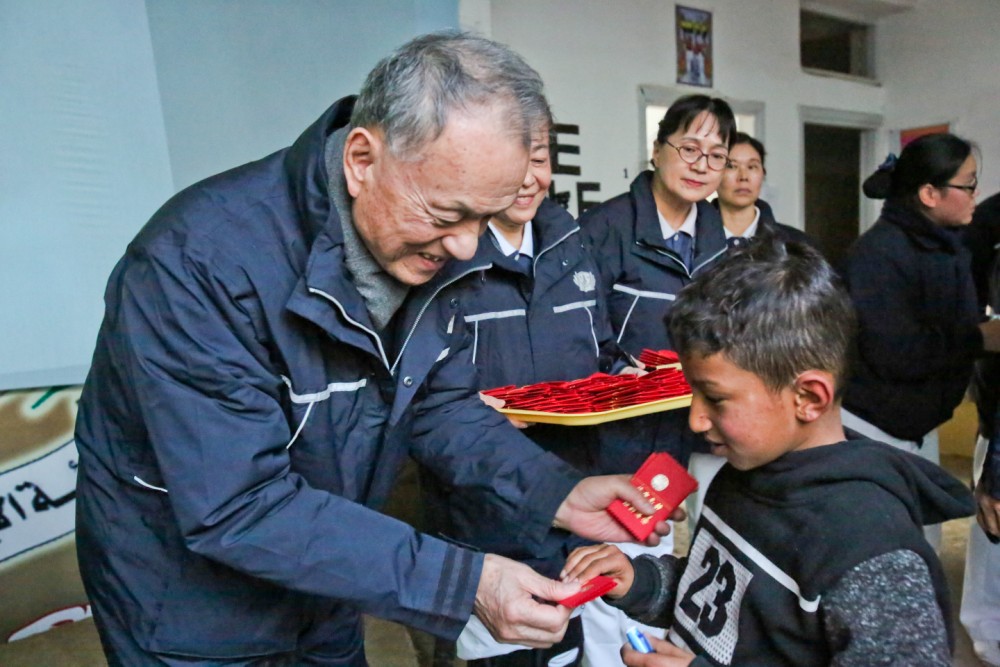By Zhang Jing-mei Translated by Tang Yau-yang Photos by Huang Xiao-zhe
The Syrian civil war has raged since March 2011, displacing millions of citizens from their homes. To help the small number of Tzu Chi volunteers in Jordan provide more aid to Syrian refugees in the country, a delegation of volunteers from Taiwan and other countries arrived in Jordan in December 2016. They immediately went to work holding aid distributions and free clinics for the needy.
Millions of Syrians have fled their homeland to escape the chaos of the raging civil war there. They face a dim future as refugees, but before they can even worry about tomorrow, they have to solve the problems that confront them today: putting food on the table, finding a dry and flat place to sleep, obtaining clothes and heat to survive through the frigid winter, and providing an education for their children.
On December 24, 2016, a delegation of 35 Tzu Chi volunteers from Taiwan arrived in Jordan. They were joined by seven more volunteers from six other countries. The delegation was there to provide relief for some Syrian refugees.
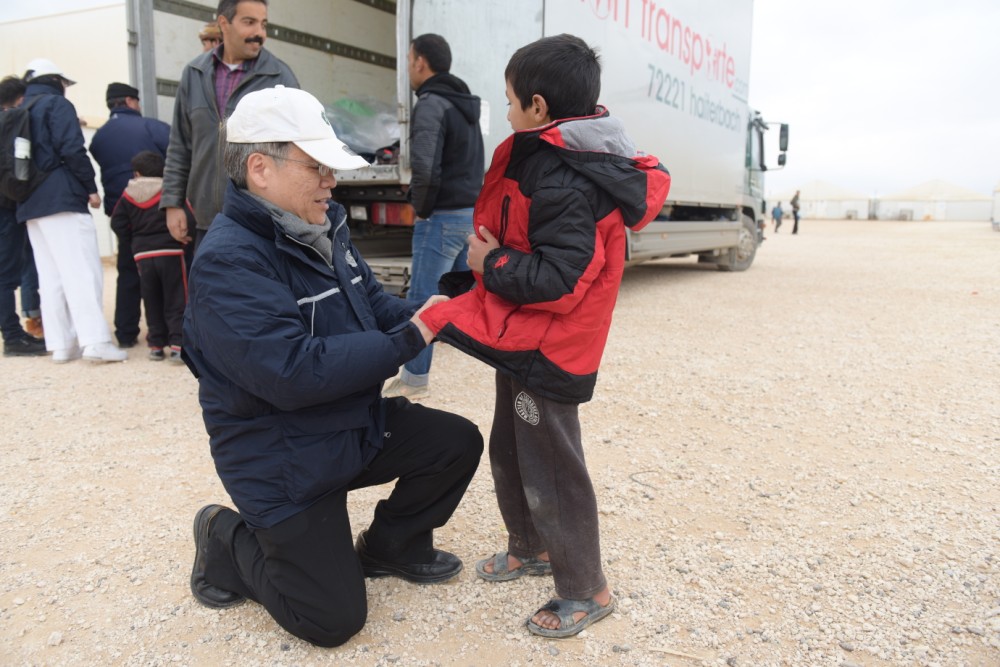
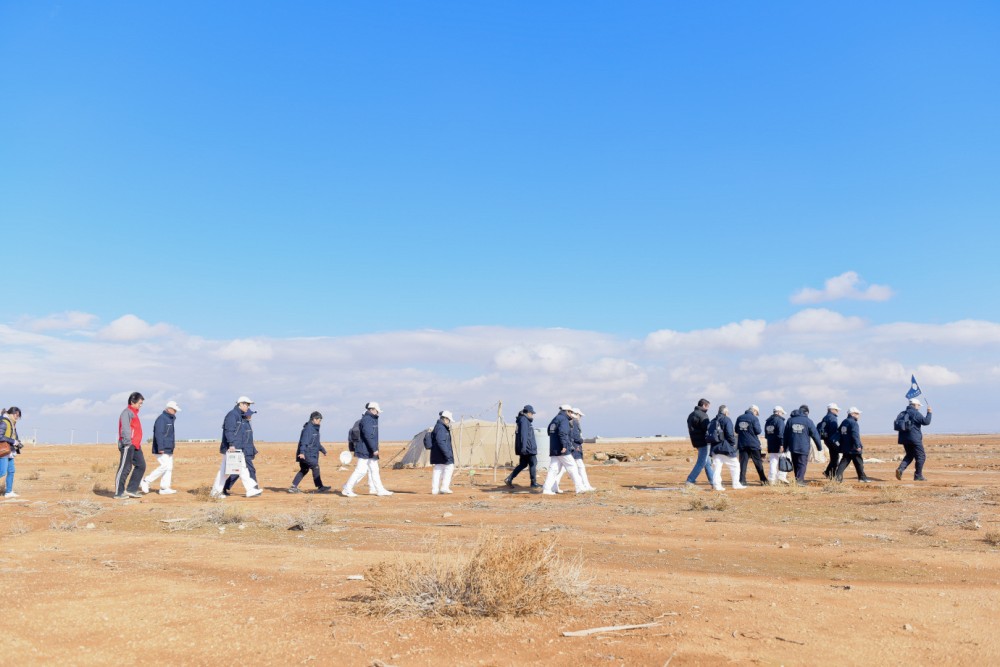
Effects of war
“Sir, have airplanes ever dropped bombs on your home?” Ayya, 10, asked a volunteer from the Tzu Chi delegation. The volunteers were visiting and delivering goods and medical care to people living in the Azraq refugee camp, located in desert terrain about 56 miles south of the Jordan–Syria border.
Ayya and her family had lived in the camp for quite a while. She liked the volunteers, so she had been following them around and helping them out.
After hearing Ayya’s question, the volunteer replied with compassion, “It’s safe here; you don’t need to be scared.”
“I’m not afraid of the cold, and I’m not afraid of hunger. I’m not afraid of anything, but I’m really scared that I might be killed by a bomb,” Ayya said, trembling.
The volunteer could feel his nose stinging and his eyes reddening with tears. He hugged the little girl and said to her, “Don’t be scared. Remember to smile every day. We’ll be back to see you.” Then he turned away from Ayya so that she wouldn’t see his tears.
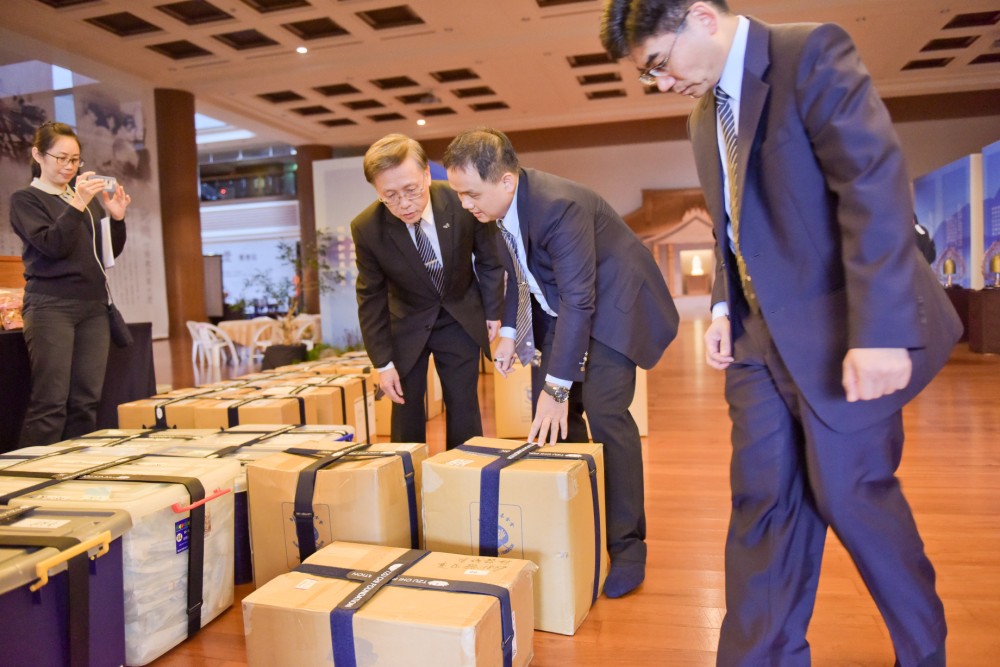
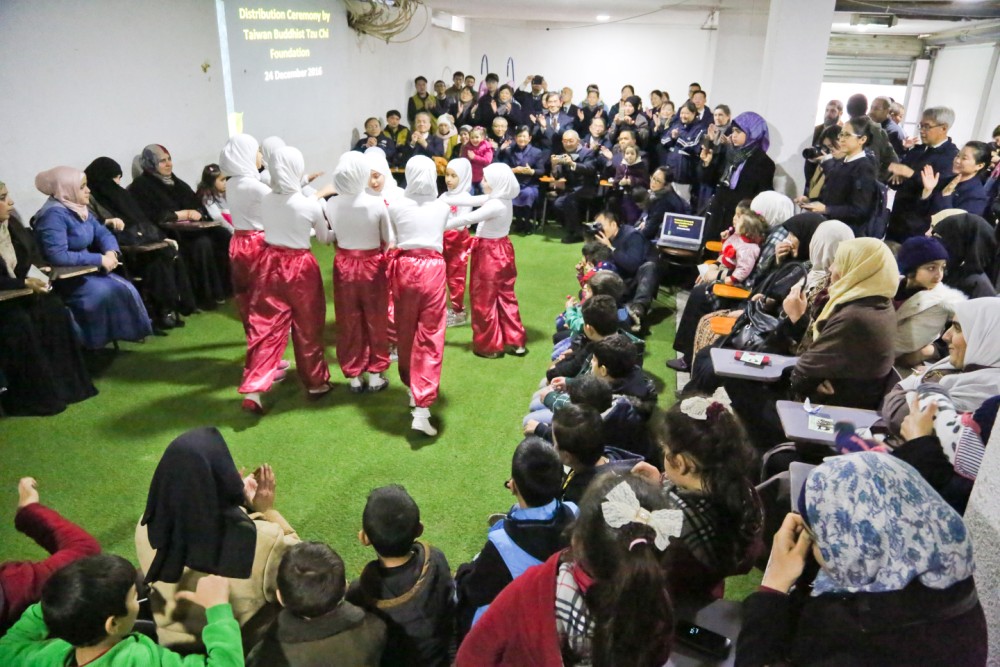
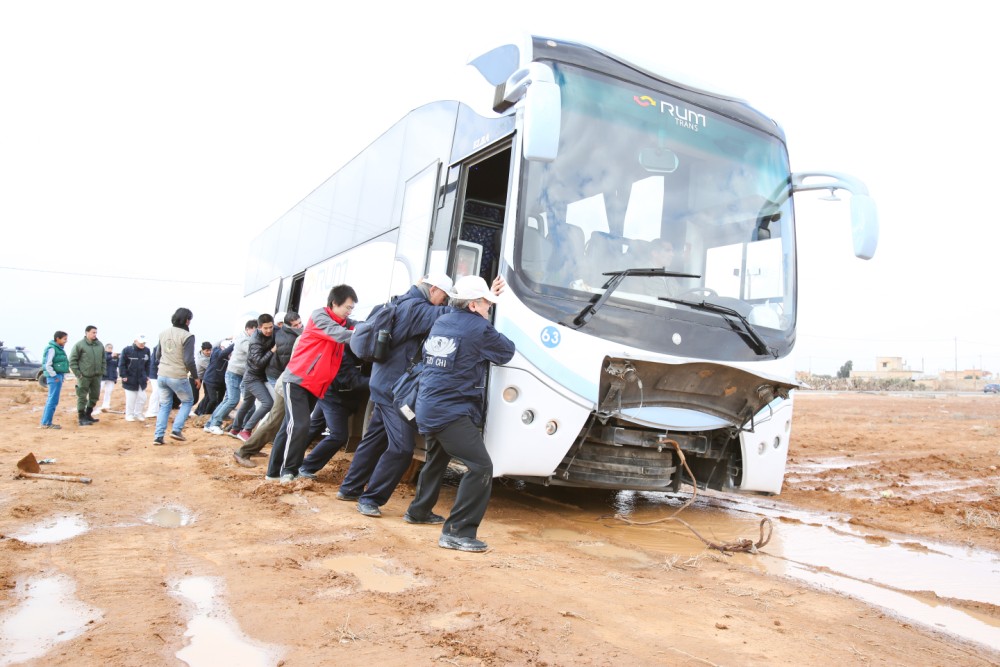
No tomorrow at the camp
The Tzu Chi delegation had set out from their hotel in Amman for the Azraq refugee camp early that morning. It was quite cold, and with clouds dark and hanging low, the sky looked like rain. Everyone in the delegation prayed on the bus for a clear day so they could smoothly carry out their mission, which was to include holding a free clinic for camp residents.
After a while, the sun peeked out of the eastern horizon and painted a rainbow on the opposite side, a rare phenomenon in deserts. The volunteers hoped the rare rainbow boded well for the mission at hand.
When they reached the Azraq camp, they gained admittance to the compound by showing a special permit that Prince El Hassan bin Talal of Jordan had issued to them.
Home to more than 38,000 refugees, the Azraq camp was divided into sections. The second section seemed to fare worse than other areas of the camp. It had no hospital or school. Residents in this district were all poor. They could not work outside the camp, so they passed their days in endless idleness and hopelessness.
Abdullah Ali, 42, came from war-torn Aleppo, a major city in northern Syria. An air raid seven months before leveled the entire street block where he lived. All 30 homes there were destroyed. Ali’s own house collapsed in the bombing, and his ankles and knees were badly injured.
In a desperate run for their lives, Ali, his wife, and their ten children were directed by an aid organization to ride, walk, ride some more, and walk some more for five days until they reached the Jordanian border. There they were admitted into the Azraq refugee camp. All the while, Ali’s fractures went untreated. The delay cost him the best time for treatment. As a result, he is now crippled.
He and his family were assigned two housing units at Azraq. The United Nations High Commissioner for Refugees (UNHCR) gave them some tarpaulins. They also received two single sleeping pads and a few thin blankets from aid organizations. A portable heater rounded out all the belongings of the family.
But one heater could not keep two sleeping units warm. In the darkness and bitter cold of the night, Ali curled up under a thin cover, thinking about how his wife and children were also suffering through the long night. He cried in silence, blaming himself for their suffering.
Each month the UNHCR gave each refugee shopping vouchers worth 20 Jordanian dinars (28 U.S. dollars). Given the high prices at shops in the camp, the vouchers could sustain Ali’s family for only about 10 to 15 days. They ate bread the rest of the time.
Given those dire circumstances, Ali was grateful for the rice and beans that Tzu Chi volunteers provided to him and his family. The supply would last them about ten days. After that, he was clueless as to what would come next. He simply could not plan that much ahead of time. All he knew was that he could not do anything worthwhile in the camp. He just wanted to leave the place.
Ali used to have a home and a life in Syria, but the civil war had turned him into a penurious refugee, drifting aimlessly like a leaf on the currents of life. He was by no means alone, not by a long shot. Millions of others were in the same boat.
Reetagi, 12, sat alone in the Tzu Chi free clinic. “Scared of the dentist?” a volunteer asked her. She shook her head and smiled almost imperceptibly.
To escape the civil war, Reetagi and her family left Syria and ended up in Jordan four years ago. She, then 8, saw corpses that the senseless fighting had left behind. “Were you scared?” asked a volunteer, holding her hands. Shoulders raised in tension and lips pressed tightly together, she just froze like a statue and stared blankly ahead.
When asked, “Do you want to go home?” she quickly shook her head in reply.
Usually taciturn and shy, the girl could recite fluently from memory several sections of the Quran. “I only feel at peace when I chant the Quran,” she told the volunteers.
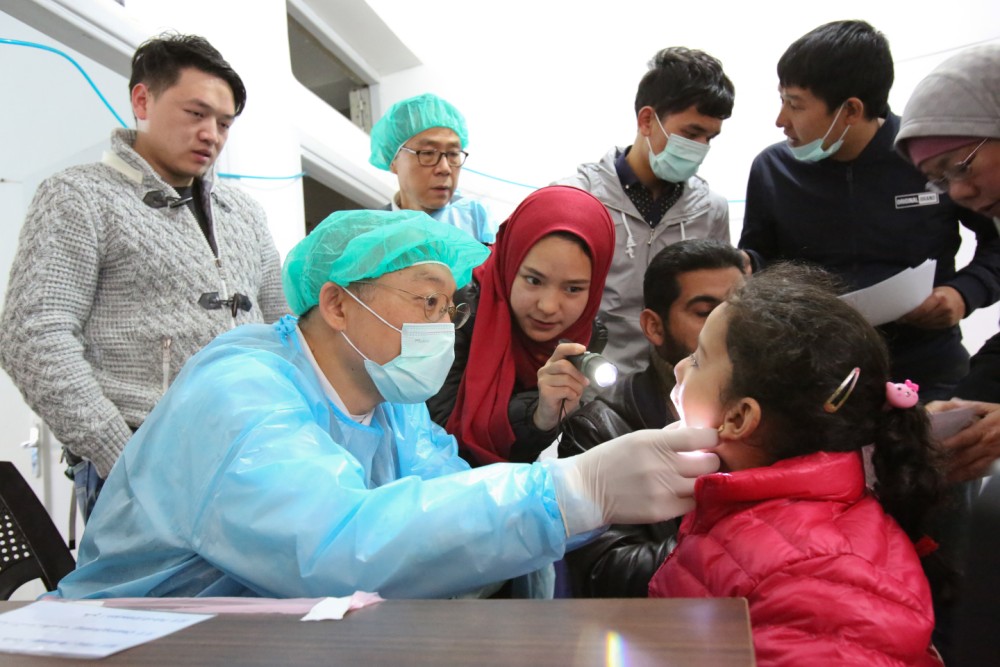
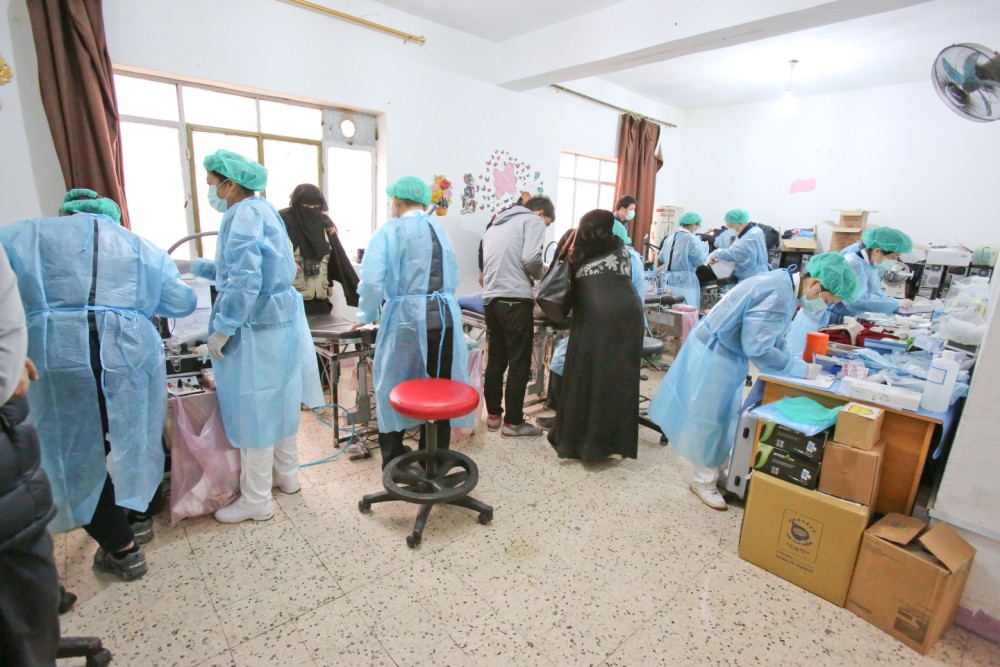
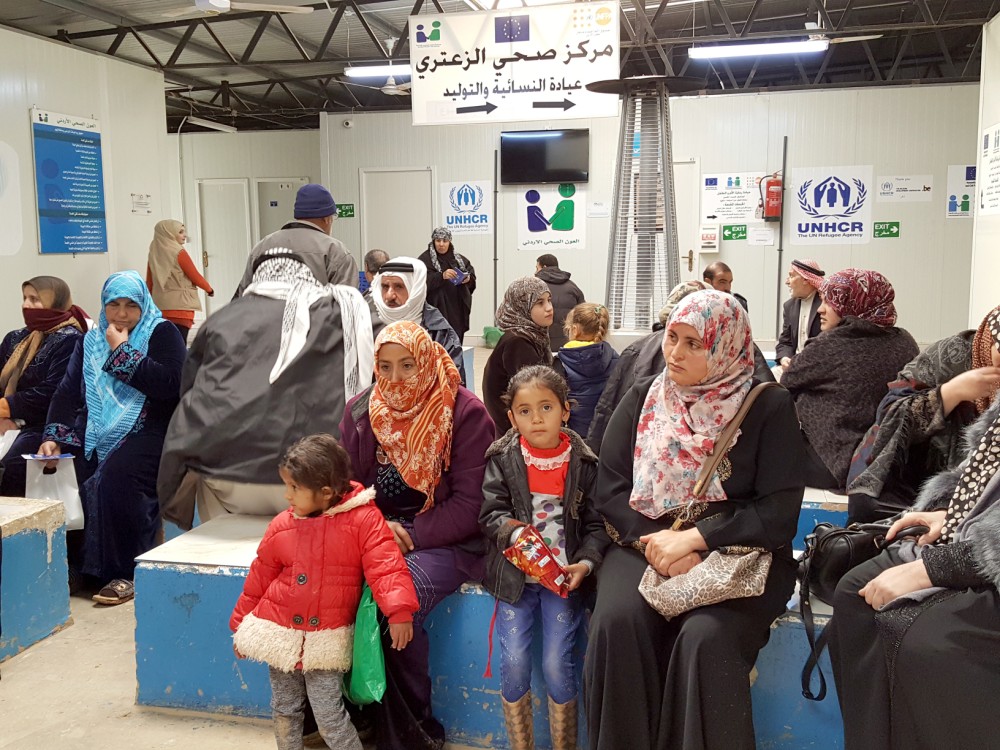
.jpg)
Eggs for refugee kids
Hard-boiled eggs were a breakfast staple at the hotel at which the Tzu Chi delegation was staying. The volunteers would take a couple of them and put them in their pockets before they set out for a day’s work. When they met refugee children who seemed particularly thin and feeble, they gave them an egg.
“Have an egg,” a volunteer said to a three-year-old boy as he put one into his small hand. The child just held it in his hand, but made no motion to eat it. Thinking that he was probably shy, the volunteer patted him on his head and urged him to eat it. The boy then put the egg—shell and all—into his mouth. The volunteer hurriedly took it back and peeled off the shell for him.
After a few days of giving out hard-boiled eggs to refugee children, the volunteers were puzzled and disheartened to discover that some of the children were simply throwing them away. After asking around, they finally learned the reason: These children had been born in the refugee camp and had never seen eggs before. They did not know what the oval-shaped, whitish objects were, much less that they were edible.
This discovery prompted volunteers to buy 500 hard-boiled eggs from their hotel. “Why do you want so many eggs? Don’t we provide enough for breakfast?” the hotel owner asked the volunteers. Chen Chiou Hwa (陳秋華), the head of the Jordan Tzu Chi chapter, told him that they were giving out the eggs to refugee children the next day. Hearing that, the owner asked Chen to take the eggs to the children free of charge.
The following morning, 500 eggs, ready to eat and neatly packaged in boxes, went with the volunteers to a women’s center in the third section of the Azraq camp. The volunteers were providing free clinical services to refugees there that day.
The eggs were placed in the pediatric clinic. Each patient received two when they entered the exam room. Almost all the patients were accompanied by their mothers. Surprised by the volunteers’ friendly gesture, the mothers peeled the eggs for their children and put them in their hands. The children took small bites and then broke into lovely smiles.
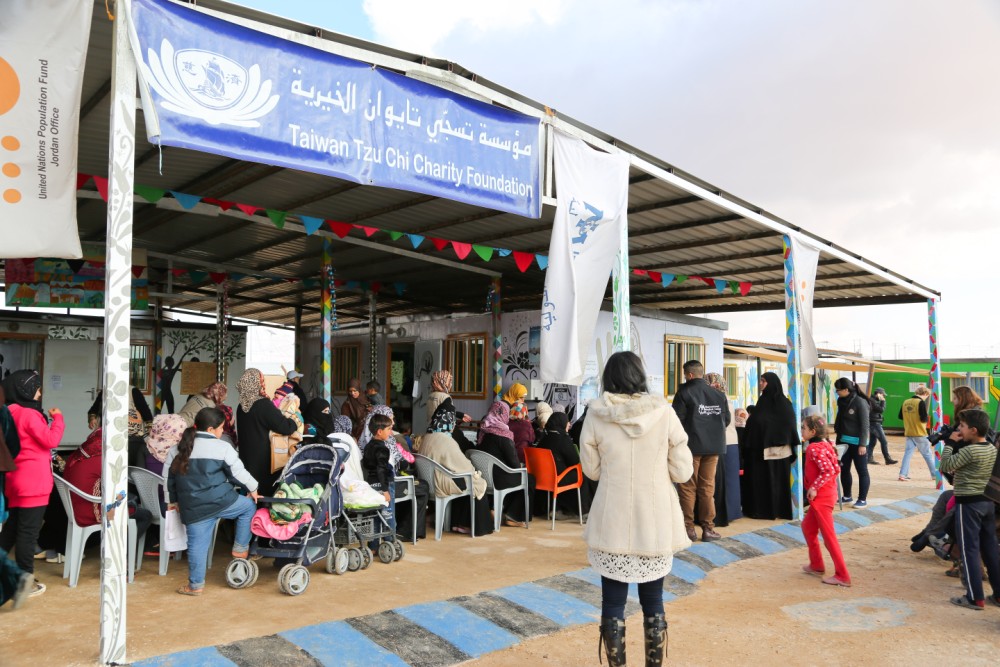
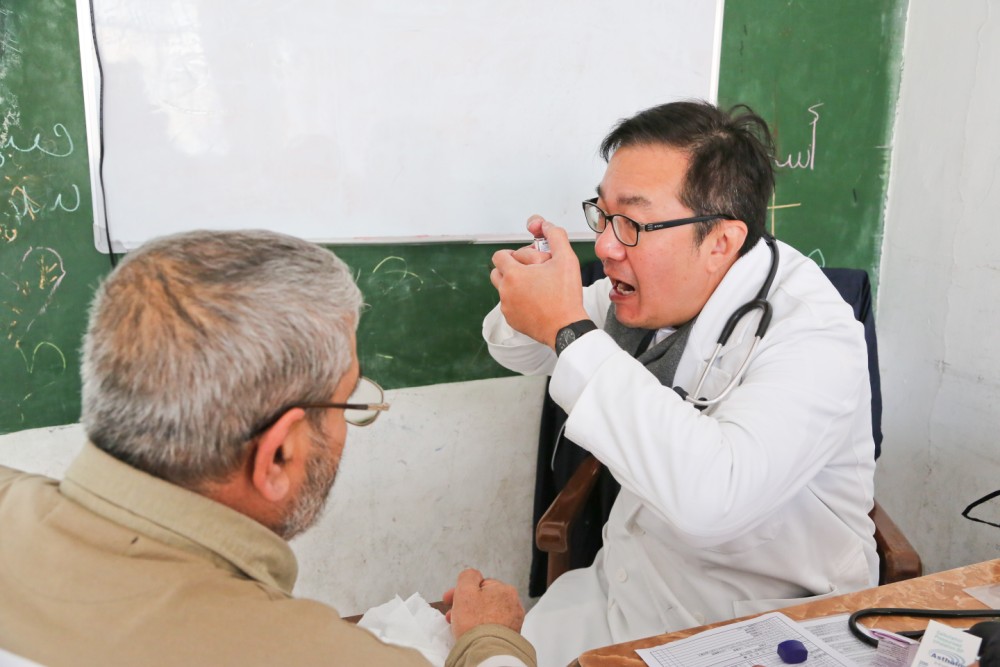
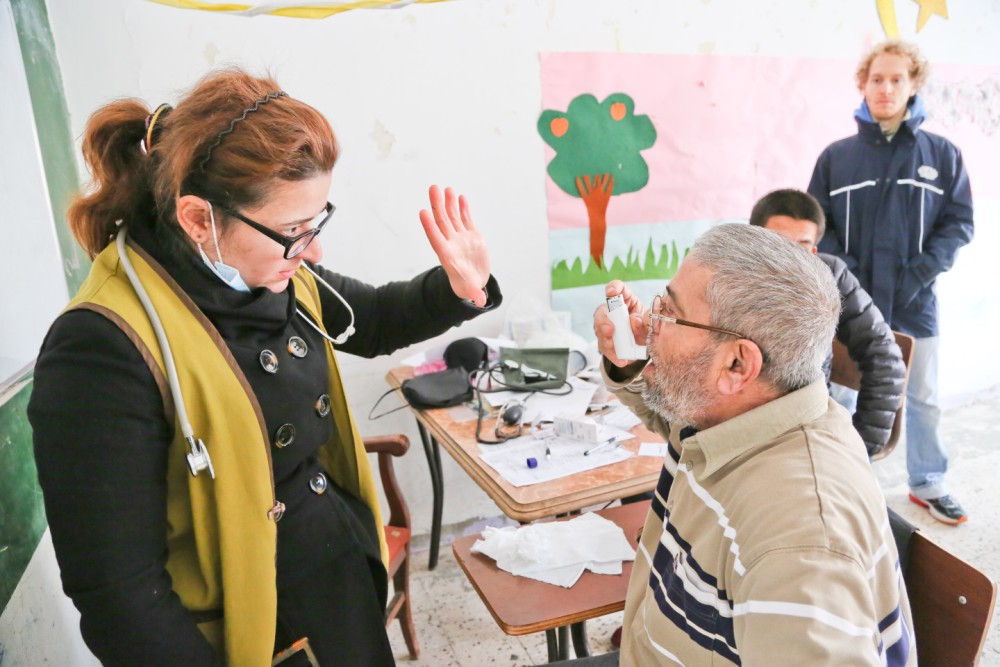
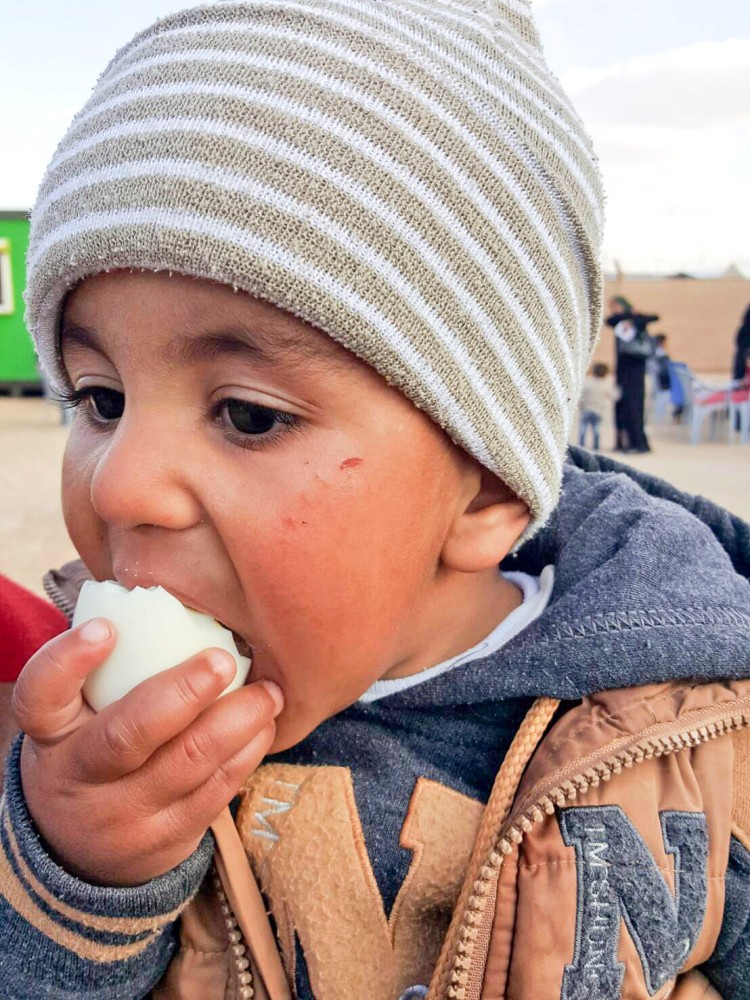
Out on their own
The Zaatari camp, established in July 2012, is located in the middle of a desert seven or eight miles from the border. Home to more than 80,000 Syrian refugees, it is the second largest refugee camp in the world.
Some refugees have chosen to live outside the camp. They have been more or less on their own because they gave up access to the housing and other facilities and services that came with camp residency. Some of them just pitched tents outside the Zaatari camp. Part of the mission for the delegation was to distribute relief goods to these refugees.
The area was hit by a rare heavy rain on the night before the delegation’s planned visit. Head volunteer Chen worried that the ground would become a big, muddy mess, which would very likely affect the distribution. But that prospect did not dampen the enthusiasm of the volunteers. They arrived at the site on schedule, resolute, confident, and ready to carry out a successful mission.
The volunteers saw tents thinly spread across a wide stretch of desert land. The temperature had dropped precipitously, and the howling winds made it feel even colder. The thin canvas of some refugees’ tents strained against the wind. A few sheep stood stolidly in their pens. Piled haphazardly on the ground were some twigs, the refugees’ only fuel for a fire to keep warm.
Though it might not appear to be an ideal place to put down a home, it still cost the residents 40 dinars (US$57) a month to rent a tent. That did not include water, which had to be purchased separately.
A little boy, shoeless and in thin, tattered sweaters, stared curiously at the group of uniformed volunteers from a distance. Then he ran away.
Shuddering in the cold, the volunteers divided themselves into groups and visited every tent to gather up Syrian children. Then they gave the children jackets or coats according to their sizes, and helped them put them on. Some children, their noses running, smiled innocently. Some wore only slippers, their feet caked in dry mud. “Are your feet cold?” a volunteer asked them. They nodded. “Is it hard for you to live here?” They shook their heads and ran away.
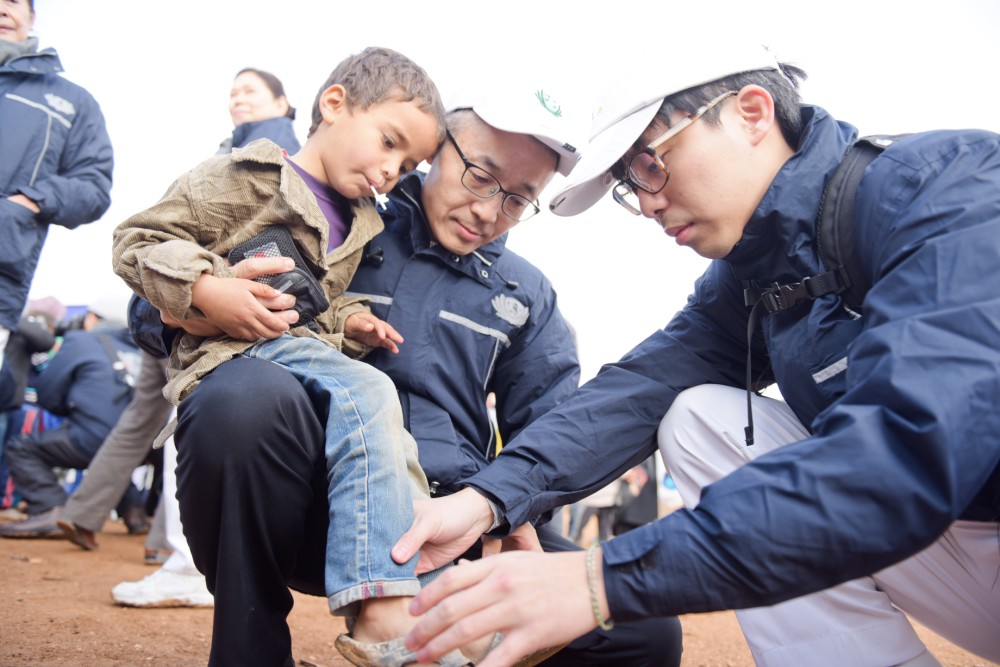
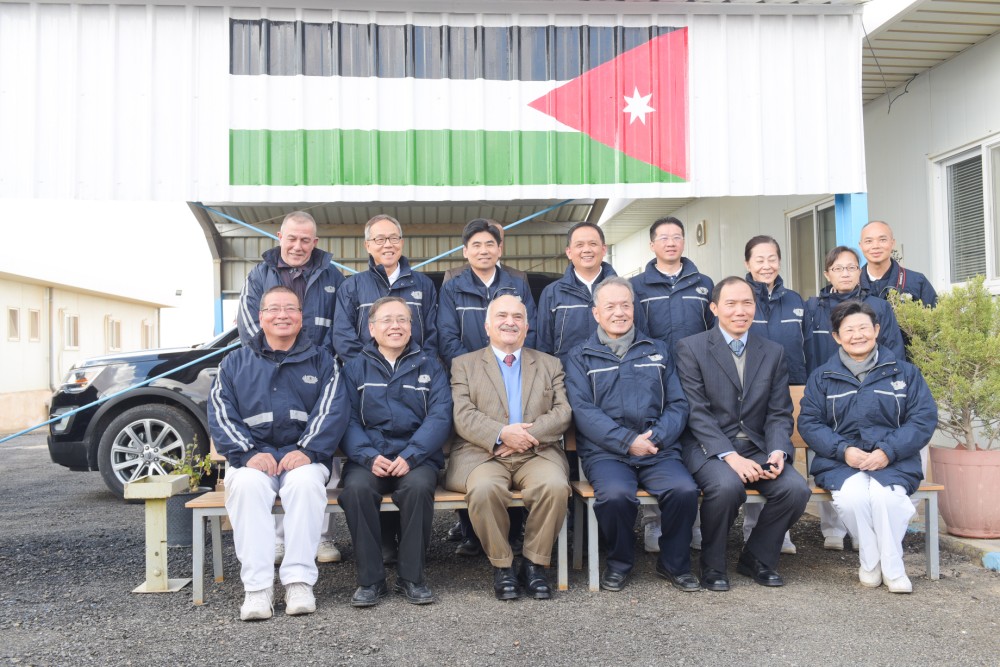
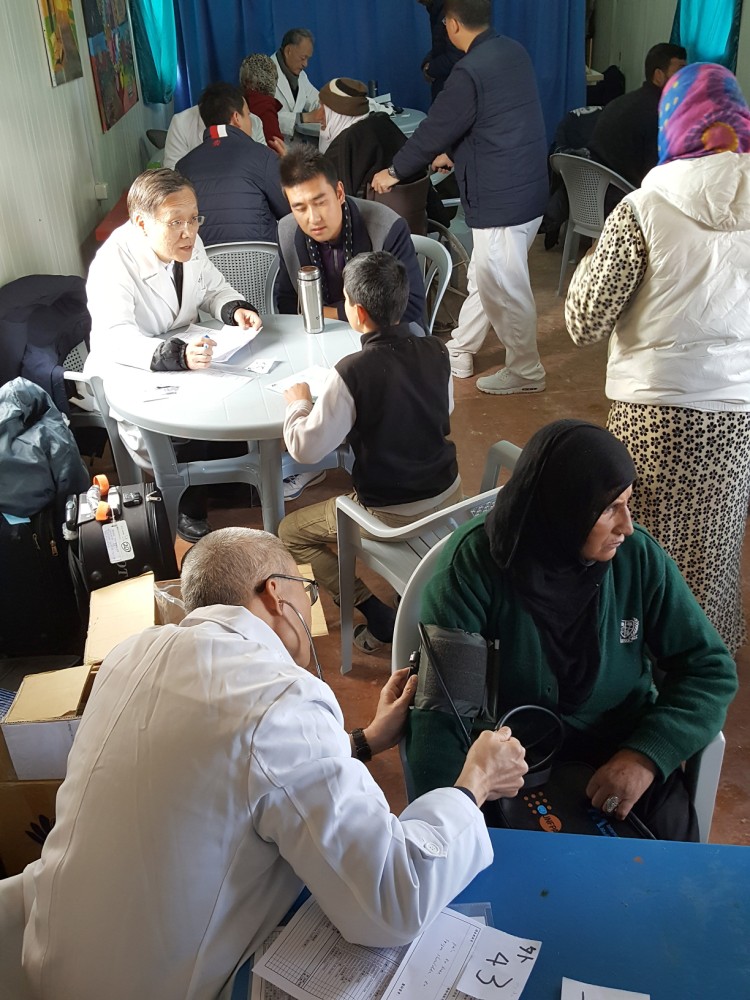
Sick kids now better
Treading on the muddy ground, volunteer Chen Chiou Hwa led Dr. Lin Chin-lon (林俊龍), CEO of the Tzu Chi Medical Mission, Chien Sou-hsin (簡守信), superintendent of Taichung Tzu Chi Hospital, and some other volunteers to the Arabian Medical Relief (AMR) clinic inside the camp. Over the past year, the Jordan Tzu Chi chapter has underwritten operations for more than a hundred children whose names it had received from the AMR clinic.
When they learned that the volunteers were visiting the clinic, many parents whose children had received surgery through Tzu Chi’s help brought their children to the clinic to express their gratitude to the volunteers. Many of the children held up hand-written thank-you notes as they and their parents entered the room where the volunteers were. The children were energetic and lively, and Chen could not help choking up with happiness. He was happy to see how much better these children were than before their operations.
Four of these children had received operations for imperforate anuses, a condition in which there is no opening where the anus should be. He recalled how miserable these kids and their parents had been before the surgery. Unable to evacuate solid waste from the body, the kids had suffered with distended bellies. Their parents rushed them to doctors for help, but some facilities simply refused to treat them while others suggested treatment that the families could not afford. The children therefore remained untreated, their lives wasting away. Through Dr. Monhnad, a Syrian, the Jordan Tzu Chi branch learned about the condition of these children, and volunteers helped them get treatment.
Some of the other kids who had gathered in the room had had surgery for hernias, and some for undescended testicles or other conditions. Now at their reunion, the children appeared to have few memories of the suffering they had had to endure until their respective operations. Their parents were all smiles. Dr. Lin said to Chen, “These smiles are more precious than anything else.”
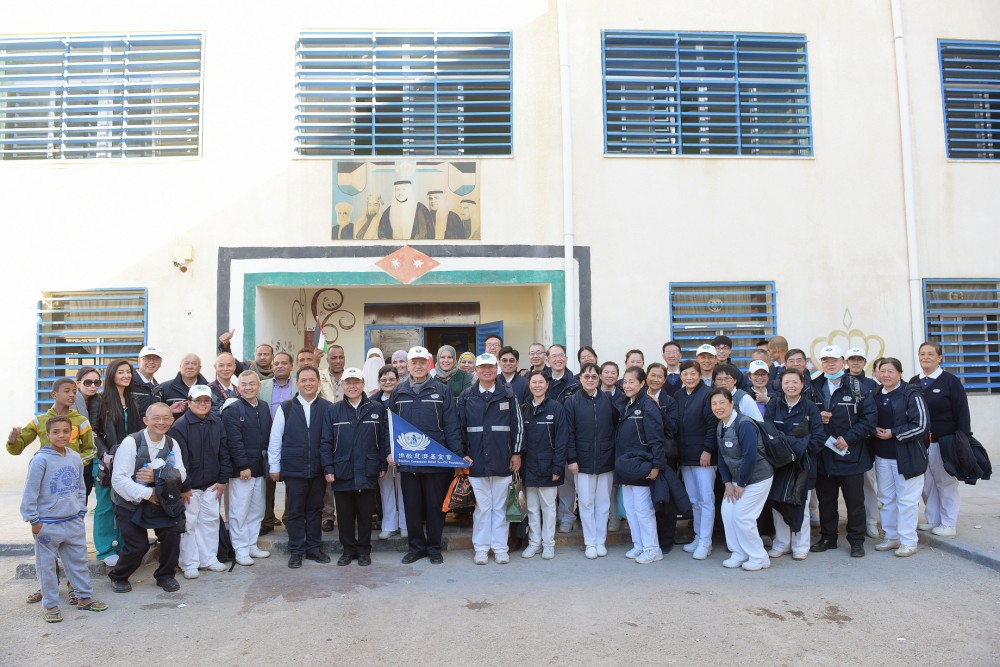
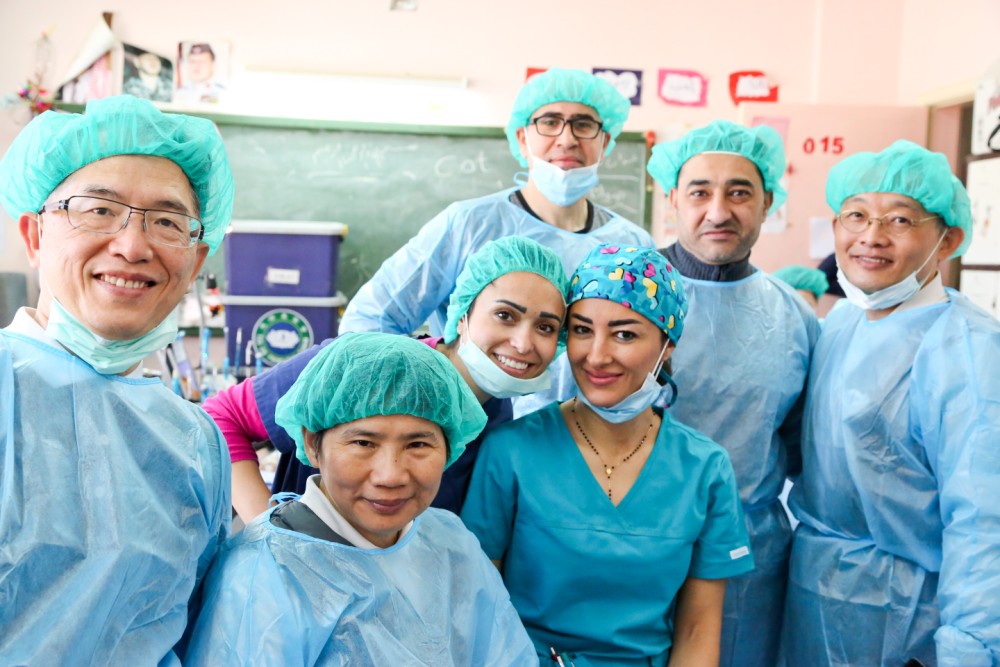
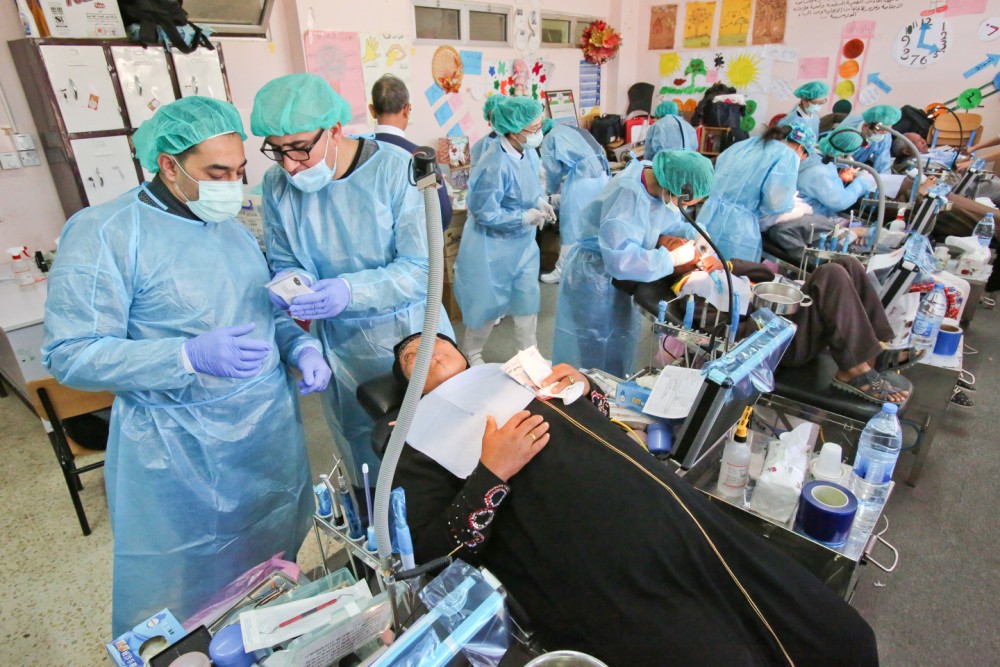
Still many more sick kids
Many other children were not as fortunate as those who had already been treated.
The news that Tzu Chi volunteers had come to the AMR clinic attracted many parents to bring their sick kids to the facility in the hope that their little ones too could get treatment.
Dr. Monhnad knelt in front of a sofa as he examined one sick child after another. Some kids were scared and burst into tears, their cries wrenching the hearts of those around them. Other children just smiled shyly, unaware that they were in critical condition.
Looking at the scene in front of him, Dr. Lin thought about the fact that in the entire Zaatari complex—the second largest refugee camp in the world and home to more than 80,000 people—there was only one X-ray machine, and it had long been broken and unserviceable. He sighed and said, “But these children are so innocent!”
Dr. Chien, his expression focused and serious, worked with Dr. Monhnad to examine the children. He saw a kid suffering from abdominal edema because of a kidney problem, another in pain due to angiomas, and a newborn baby afflicted with a severe hernia. There were also other kids who needed prompt attention. With his brows knitted, he said to Chen and Lin, “These children have to be sent to the hospital ASAP.”
Three days later, the volunteers arranged for seven of the most severely sick children to have operations at Akilah Hospital in Amman.
But at the Zaatari refugee camp, more than 300 sick children were still waiting for a chance to receive surgery.
Refugees and Bedouins
The Jordan Tzu Chi chapter has been providing regular assistance to 79 refugee families in Amman and Ar Ramtha. During their trip to Jordan, the delegation held a year-end blessing ceremony for these families.
One Syrian woman, like the other participants at the gathering, received from Dr. Lin a hong-bao, an artistically designed small red packet carrying blessings from Tzu Chi. She opened her purse and took out another hong-bao, one that she had received during the blessing ceremony the year before. With both packets in hand, she seemed to review in her mind the interactions that her family and Tzu Chi volunteers had had during the year.
Four years before, she and her husband took their family to Jordan to escape the civil war at home. However, her husband later went back to Syria to fight, and he ended up in prison there. She had had to raise their four children alone in a strange country. They had very little to live on and no one to turn to until Tzu Chi volunteers started caring for them and providing financial aid for her children so that they could continue their schooling. Eventually her husband returned to Jordan and joined the family again, but he was sick and his legs were disabled.
In the face of such seemingly unending adversity, she felt warm at the thought that Tzu Chi had been behind her family. She gently stroked the red packets in her hand, her face at peace as the Tzu Chi song “Prayer” began to play through the public speakers at the venue.
Besides giving assistance to Syrian refugees, Tzu Chi volunteers in Jordan have also been caring for several communities of Bedouins for 17 years.
On the seventh day of the delegation’s visit, Chen led the volunteers to an area near the southern end of the Dead Sea, where they would be holding a free clinic and an aid distribution for some local Bedouins and other needy people there. On the way to their destination, the volunteers saw the azure hue of the Dead Sea. Israel was visible across this deepest salt lake in the world.
The volunteers used a school in their host Bedouin community as the venue for the free clinic and aid distribution. Though not very spacious, the classrooms were clean, neat, and adequate for the occasion.
The volunteers provided medical services in pediatrics, internal medicine, surgery, traditional Chinese medicine, and dentistry. At the same time, volunteers handed over daily necessities to 500 families.
In the crowd was an old man in traditional Arabian clothing, standing quietly waiting to receive his goods. In his hand was a claim check for the event. When he saw Tzu Chi volunteers, he broke into a big smile, revealing a toothless mouth. Volunteers carefully placed his goods in a plastic bag for him and watched him slowly walk away with the help of a walking stick.
The volunteers could not help having mixed feelings. On the one hand, they were happy that these needy people were getting some reprieve from their hardships. On the other hand, their hearts went out to them—if not for such a hard life, they would never have had to show up at the distribution at all.
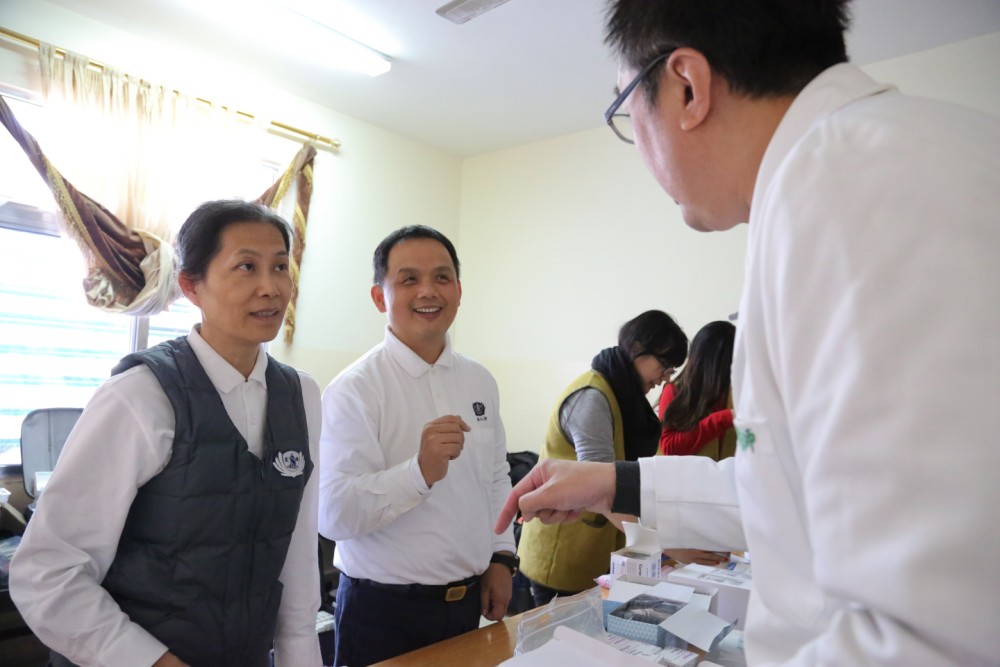
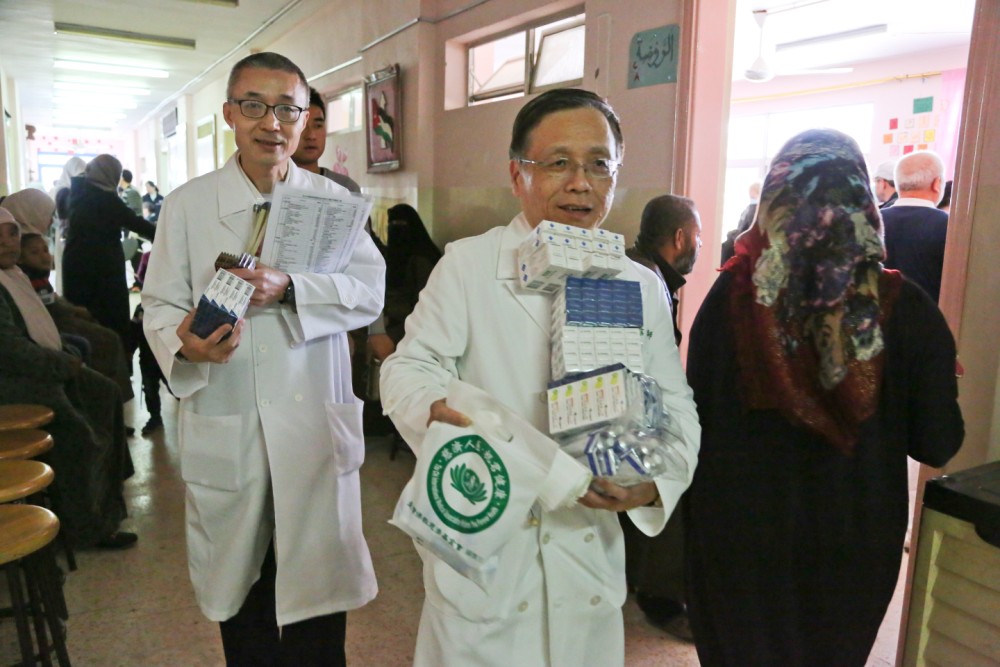
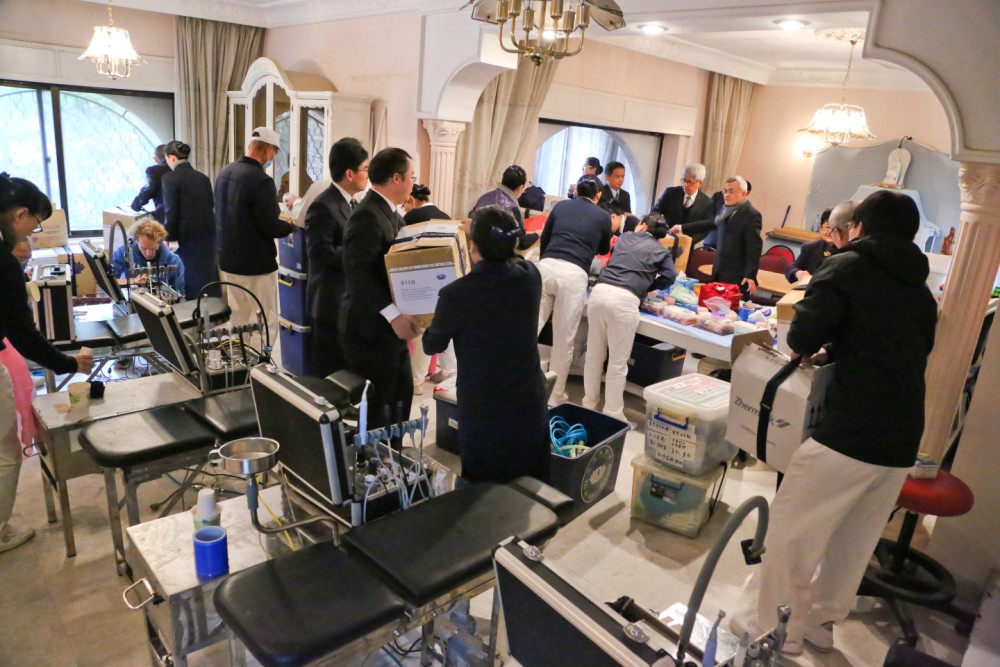
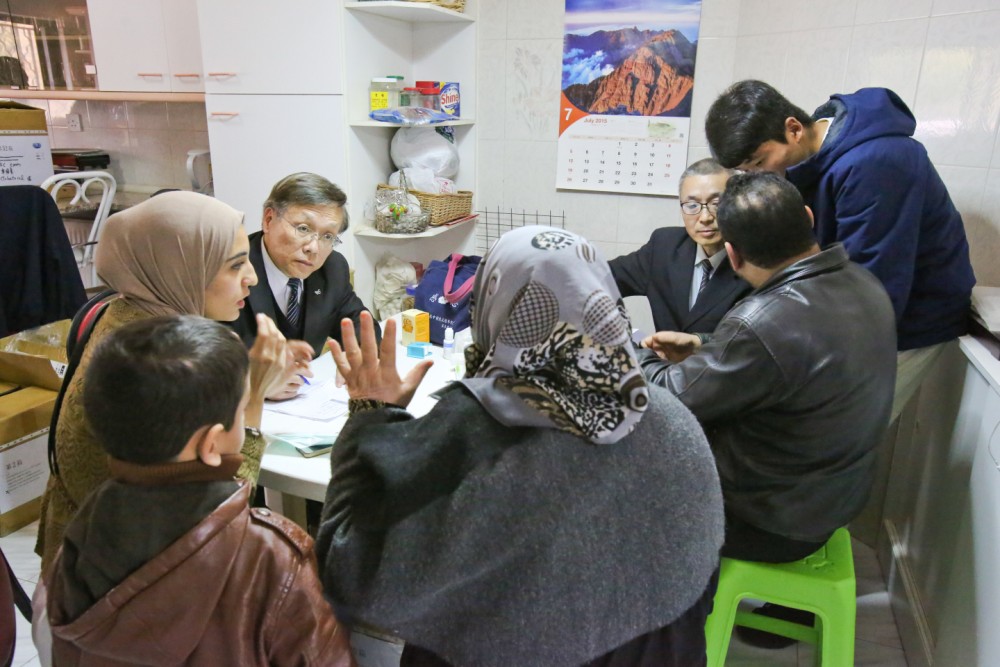
One more time
For members of the delegation from Taiwan, December 31, 2016, was their eighth and last day in Jordan. Early that morning, they set out for Chen’s home. They were spending their last three hours in Jordan holding a free clinic at Chen’s place for some refugee families in the Amman area that received regular aid from Tzu Chi.
Chen felt guilty for being such a demanding host to the delegation. He felt that he should have been more hospitable than to put his guests to work in their final hours in the country. But they just patted him on his shoulder and smiled at him, as if telling him not to worry about it. Then they all went right to work and set up his home for the free clinic. Chen turned around and wiped away his tears.
A few doctors moved the tables and sofas to the sides in the living room to make room for four dental chairs. Dentists and their assistants donned their blue gowns, and soon the sound of dental equipment filled the living room. If nothing else, the high-pitched drone of the instruments uniquely and unmistakably identified this space as a dental clinic.
Gastroenterologist Cai Xiao-yun (蔡筱筠) moved a small table into the hall by a bedroom at which patients could check in. The kitchen became the pharmacy. Pediatric patients were examined in one bedroom while another room served patients in internal medicine and surgery.
More than ten Syrian patients had already gathered at Chen’s home waiting to be seen. They had all been exiled in Jordan for over three years.
Looking at the hustle and bustle in his house, Chen thought back to five days earlier when they were on their way back from an aid distribution and their bus got deeply stuck on a muddy road. Everyone got off the bus and pushed together to free the vehicle.
That incident mirrored another event decades before. One day more than 40 years ago, Master Cheng Yen and her followers went to visit the needy in the countryside in Taiwan. Their bus also got stuck in mud on the way, and they had to get off the bus and push together to set it free.
Both bus incidents took place when Tzu Chi volunteers were delivering aid to needy people. Though they were separated by 40 years, Chen’s heart warmed as he thought of the similarity between the two events.
Chen felt grateful as he reflected on how he was not alone on the road of helping the needy. Though over the years he had shouldered a heavy burden in Jordan due to the small number of Tzu Chi volunteers in the country, he never felt the work was too hard for him. Challenges might abound, but he had faith they could be overcome one by one, just as he had overcome numerous challenges before.
